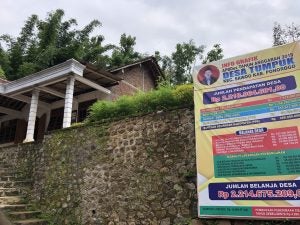Inclusive hamlet budget consultation in East Java Village budget infographic in front of village office
Dissertation Project
Raising Representation? Gender and Village Budgeting Reforms in Indonesia
How can capture by traditional male elites be overcome to expand the substantive representation of women’s interests? Institutional reforms to make policymaking more inclusive often do not meaningfully expand the participation or representation of women and other marginalized groups. To improve representation, several districts in Indonesia implemented regulations requiring separate forums for women and other marginalized groups to submit proposals for village development plans and budgets. This paper leverages original data from surveys, survey experiments, and village planning documents to evaluate the effects of this novel reform. Overall, the reforms succeed in amplifying the voices of female community leaders but fail to shift actual spending towards women’s priorities. The analysis shows that inclusive consultations increase the representation of the preferences of women in non-binding village development plans. However, inclusive consultations do not shift spending priorities towards women’s preferences in binding annual budgets. Moreover, improvements in female representation in development plans more closely resemble the preferences of pre-existing female community leaders than the preferences of ordinary women in the village. A survey experiment with village heads confirms that village heads do not change their policy priorities in response to information about women’s preferences. Collectively, the evidence in this paper suggests that political power and elite capture—not information and participation—can be the key obstacles to improving the substantive representation of ordinary women’s interests.
[Working Paper version, under review]
Other Projects
Women’s Empowerment and Local Governance in Indonesia
Women’s interests remain underrepresented in local policymaking despite the implementation of community-based and participatory planning and budgeting programs in much of the developing world. Male dominance in neighborhood institutions may make it difficult for women’s voices to be heard even if female attendance quotas in village planning and budgeting meetings are met. This field experiment evaluates the effects of an intervention in Indonesia which will train 1) neighborhood-level women’s groups and 2) neighborhood association leaders about the importance of gender inclusivity and strategies for increasing women’s participation at the neighborhood level and better representing women’s interests in hamlet and village-level policymaking. The experimental design will test whether a supply-side strategy that targets neighborhood association leaders is more effective than a demand-side strategy that targets only women’s groups. This study is supported by the J-PAL Governance Initiative.
The Effects of a Non-Adversarial Social Accountability Initiative on Public Works Provision: Evidence from a Large-Scale Experiment in the Philippines (with Nico Ravanilla, Allen Hicken, and Ron Mendoza)

In developing countries, politicians often intervene in the provision of public works to favor projects, localities, and contractors that facilitate rent extraction and patronage. Can social accountability targeted at politicians improve public works distribution in these contexts? Nine months before the 2019 Philippine elections, we randomly assigned half of the 238 congressional districts in the country to a treatment in which the largest coalition of civil society organizations conducted a politician-targeted advocacy campaign. This campaign provided information on patterns of clientelistic public works provision and recommended specific actions for legislators to improve procurement and distribution in their districts. We find that treated congressional districts allocated significantly less funding toward public works projects most prone to kickbacks. However, the intervention had no effect on procurement transparency and clientelistic distribution. Our findings suggest that even in a patronage democracy, pressure from civil society can reduce certain distribution practices that are prone to corruption. However, incumbent politicians are unlikely to respond when advocacy threatens their hold on power.
[Working Paper, under review]
Collective Efficacy, Political Skills, and Women’s Participation in A Single Party State: A Field Experiment in Vietnam
(with Paul Schuler, Quynh Nguyen, Markus Taussig, and Mai Truong)
We implement a field experiment in Vietnam to evaluate the effects of a collective efficacy and political skills training program administered through village-level women’s groups on levels of political efficacy and participation. This study is part of the EGAP Metaketa Initiative.




